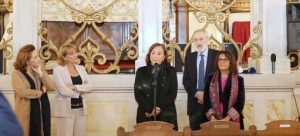NEWS Italian Interior Minister denounces violent language as she visits synagogue in Rome
“Violent language may result in violent behavior.” Interior Minister Luciana Lamorgese said on a visit to the Jewish community in Rome last week. Lamorgese was welcomed by President Ruth Dureghello, Chief Rabbi Riccardo Di Segni and UCEI President Noemi Di Segni. The visit, which had been previously scheduled, was an occasion to talk about complex issues which have emerged forcefully over the last days and weeks.
“Violent language has gained gradual acceptance, as if it were normal to speak like that. Confrontation must be civilised, not a clash,” underlined Samorgese on a press conference held at the Great Synagogue of Rome after a meeting with representatives of the community and UCEI President.
Through her speech, she seized the opportunity to express her closeness and friendship with senator for life Liliana Segre. “The time has come for decisions and stability. It is time for everyone to take their responsibilities, we must not underestimate the hatred problem.”
She also noted that “Italy is one of the safest countries. It has never lowered its guard because it has always kept the memory alive. The real challenge is to do it day by day,” she stated.
Lamorgese also said a few words about the attacks on 9th October 1982, still a fresh wound which marked a turning point for the security of Jewish sites. She focused on the role of the OSCAD, the State Police Observatory for the Security against Discriminatory Acts which works in collaboration with UCEI and the CDEC’s (Centre of Contemporary Jewish Documentation) Observatory for anti-Semitism.
While doing the honors, Dureghello expressed her gratitude to Lamorgese for the intense work done by law enforcement for the preservation and safety of Jewish places. She also talked about a “cordial encounter under the sign of exchange.” Among the issues addressed were contrasting anti-Semitism, the widespread presence on the ground, the creation of challenges and the sharing of projects.
Rabbi Di Segni mentioned October 9, 1982 attacks as well, recalling how “Italy has since then become a model, averting incidents which elsewhere have been bloody and deadly.” The visit was not only focused on security, he remarked. The talk about the vitality of the Jewish community in Rome, which lives in a place playing a major role for our identity, has been fundamental. “Our presence brings values which enriches the whole country. This visit is also an acknowledgement of that,” he added.
Regarding the fight against hatred, President Di Segni made a proposal, “It is not enough to act and react through police operations and specialized forces. The normative system and the mentions to the Penal Code need to be revised. What is apology of fascism? What is a racial aggravation? What is anti-Semitism? Which is the danger to contain? We need to educate our children to culture and coexistence already in the very first years of their lives.”
Translated by Mattia Stefani and revised by Claudia Azzalini, both students at the Advanced School of Modern Languages for Interpreting and Translation of Trieste University and interns at the newspaper office of the Union of the Italian Jewish Communities.

